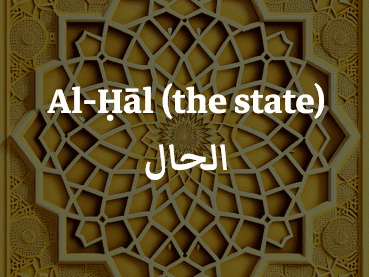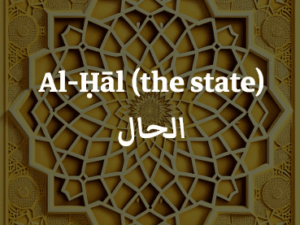Al-Hal (the state) / الحال

Regular ḥāl with a noun
The word al-hal in Arabic (الحال) means ‘the circumstance, condition, or state’ in Arabic. Grammatically it refers to an adjective or participle (اِسْم الفاعل / اِسْم المَفْعول) in the indefinite accusative case (نَكِرة مَنْصوب), which provides additional information to an already complete sentence by answering one of two things:
- “How?” and “In what manner?” did the subject perform the action
- In which state was the complement/object (المَفْعُول) when the action was performed.
In English translation specifically, the ḥāl (الحال) corresponds primarily to copredictive adjectives or adverbial participles (referring either to the subject or the object).
As stated above the ḥāl (الحال) is usually an adjective or participle (اِسْم الفاعل / اِسْم المَفْعول) in the indefinite accusative case (نَكِرة مَنْصوب). Henceforth, it agrees only in gender and number with the noun to which it refers. The said noun can be in the nominative (مَرْفُوع), accusative (مَنْصُوب) and genitive (مَجْرُور) forms.
| Zainab came crying | جاءتْ زَيْنَبُ باكيةً |
| The army came back victorious | رَجَعَ الجَيْشُ مُنْتَصِرًا |
| We left the door open | تَرَكْنا البابَ مَفْتوحًا |
Note: The حال can also take the shape of a quasi-sentence (preposition + noun).
They (fem.) went to the library in a hurry ذَهَبْنَ إلى المَكْتَبةِ في عَجْلةٍ She gladly helped her friend ساعَدَتْ صَدِيقتَها بِسُرورٍ
State clause introduced by wāw / واو الحال
The wāw of ḥāl (واو الحال) is the وَ conjunction that initiates a “state clause” حال when paired with either a detached pronoun (ضَمِير مُنْفَصِل) or definite noun (اِسْم مَعْرِفة), both left in their nominative form (مَرْفُوع). This can be understood equivalently as ‘while’ and ‘as‘. In other words:
| واو الحال + ضَمِير مُنْفَصِل / اِسم مَعْرِفة مَرْفُوع = حال |
| wāw of hāl + detached pronoun/definite noun nominative case = hāl |
The pronoun or the noun will act as the subject (مُبْتَدأ) of a nominal sentence (جُمْلة اِسْميّة), followed by a verb/noun/particle that’ll be part of the information (الخَبَر).
| He shouted in the street while the people were asleep | صاح في الشارِع والناسُ نِيامٌ |
| They’re walking in the street arrogantly | َيَمْشُونَ في الشارعِ وَهُمْ يَتَكَبَّرُون |
| He’s driving while drinking his coffee | يَسُوق السَيّارةَ وهو يَشْرَبُ قَهْوَتَهُ |
Note: The status clause حال can also take the shape of a verbal sentence introduced by wāw of ḥāl
She broke the TV as her father came back from work كَسَرَتْ التِلْفاز وقد رجع أَبوها من العَمَل
Note 2: It is also possible to find “status clauses” without the wāw of hāl (واو الحال).
أَطْعَمُوا الكَلْبَ صَباحًا يَسْتَبْشِرونَ They fed the dog in the morning rejoicing
Additional complements : The absolute object, the state and the disambiguation

Learn about Arabic grammar's additional complements: the absolute object, the state, and the disambiguation. Master the use of these advanced grammar concepts to take your Arabic language skills to the next level.
Course Provider: Organization
Course Provider Name: ArabiKey
Course Provider URL: https://arabikey.com
5

Responses